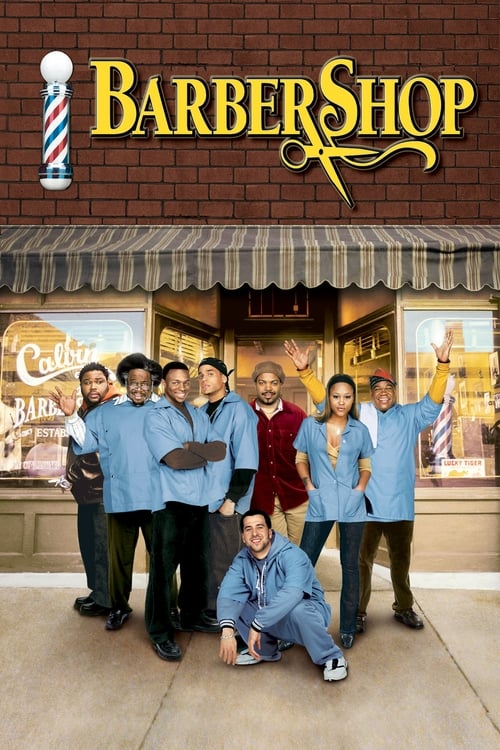Barbershop – Film Review
Published March 4, 2024

The 2002 comedy film Barbershop, directed by Tim Story and written by Mark Brown, Don D. Scott, and Marshall Todd, has managed to carve its niche within the cinematic landscape as a beloved comedy-drama that explores the nuances of urban life, community values, and the trials of small business ownership. With its humor, ensemble cast, and relatable storyline, it resonated with audiences and critics alike, albeit with some flaws that couldn’t be overlooked.
Set in the South Side of Chicago, Barbershop centers around Calvin Palmer (played by Ice Cube), the reluctant owner of a barbershop he inherited from his father. The establishment serves not only as a place for haircuts and shaves but also as a vibrant community hub where diverse opinions and experiences are shared, often leading to comedic or contentious debates. The plot unfolds as Calvin, struggling with financial woes, decides to sell the shop to a local loan shark but soon realizes the true value of the establishment to himself and the community.
The film excels in capturing the spirit and camaraderie of the barbershop setting, weaving in elements of humor, struggle, and unity that feel genuine and relatable. The portrayal of the barbershop as a microcosm of the community it serves offers insightful commentary on urban life and the importance of such spaces in fostering dialogue and relationships among individuals from varied backgrounds.
Barbershop boasts an ensemble cast that brings life to the eclectic group of characters, each contributing to the film’s dynamic atmosphere. Ice Cube’s portrayal of Calvin is commendable, effectively capturing the internal conflict of a man torn between financial security and community loyalty. The supporting cast, including Anthony Anderson, Cedric the Entertainer, Eve, and Sean Patrick Thomas, delivers memorable performances that highlight their characters’ quirks, thereby enriching the narrative.
Cedric the Entertainer, as the elderly barber Eddie, steals the show with his humor and wisdom, becoming the film’s moral compass. His portrayal of Eddie serves as a reminder of the history and tradition embedded within the barbershop walls. However, while the characters are engaging, their development feels somewhat constrained by the film’s plot. The ensemble’s potential is not fully realized, as character arcs are often sidelined to accommodate comedic or dramatic sequences, leaving viewers wanting more depth.
The comedy in Barbershop is one of its strongest assets. The film skillfully balances humor with moments of sincerity, tackling various social issues without becoming preachy. The spirited debates within the barbershop touch upon topics like race, politics, and social justice, reflective of conversations happening in similar real-life settings. However, certain comedic elements have not aged well, coming off as outdated or less impactful in today’s context.
Moreover, the film received criticism for some controversial jokes made by the character Eddie, specifically regarding civil rights leaders. While intended to reflect the uninhibited nature of barbershop conversations, these moments highlight the fine line between comedy and insensitivity, suggesting that the film’s humor could have been more carefully calibrated to avoid diminishing its otherwise powerful messages.
Director Tim Story succeeds in creating an inviting atmosphere that encapsulates the essence of the barbershop setting, utilizing close-up shots and a warm color palette to enhance the sense of community. The soundtrack, blending hip-hop and R&B, complements the film’s urban setting and tone. Nonetheless, the film’s pacing and structure exhibit weaknesses, with some subplots feeling disjointed or underdeveloped, detracting from the main narrative’s flow and emotional impact.
Barbershop made a significant cultural impact, sparking discussions about the representation of African-American communities in cinema and the importance of preserving local cultural institutions. It paved the way for sequels and spin-offs, solidifying its status as a franchise, though none matched the original’s charm and freshness. Despite its imperfections, the film remains a notable contribution to early 2000s cinema, celebrated for its humor, heart, and honest portrayal of community life.
While Barbershop delivers a blend of humor, warmth, and societal observation, making for an enjoyable and thought-provoking viewing experience, it falls short of its potential due to underdeveloped characters and certain comedic elements that haven’t aged gracefully. The film shines when it delves into the heart and soul of its setting, offering a window into the lives of its characters and the community they inhabit.
